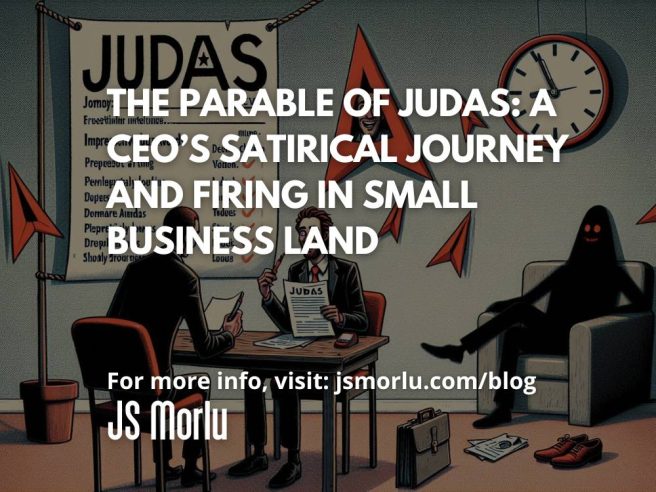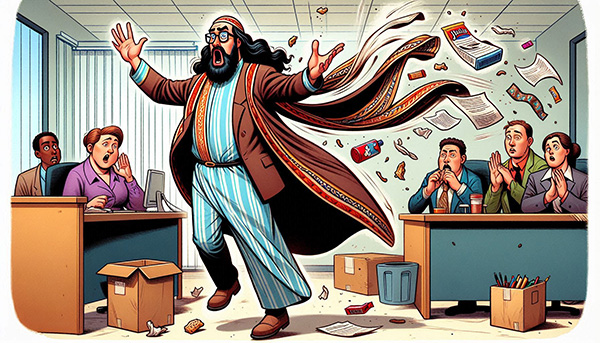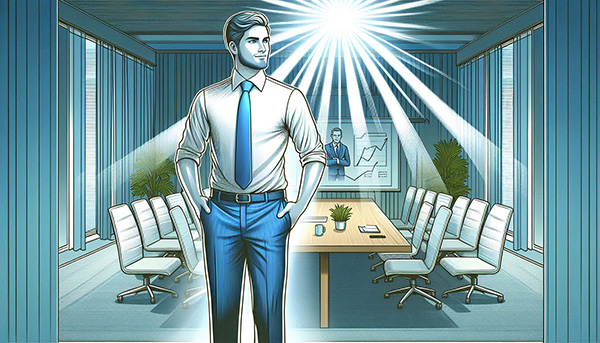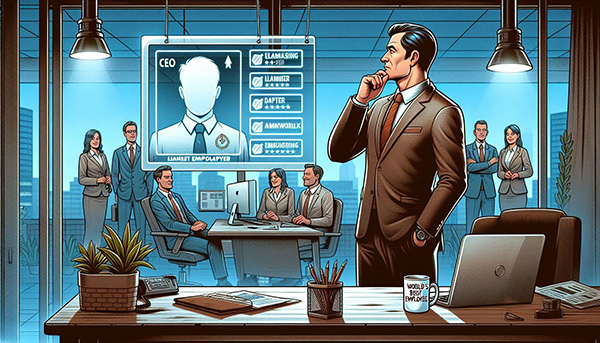By: John S. Morlu II, CPA
Introduction
Once upon a time, in the fast-paced, unpredictable world of small businesses, there was a company that stood out like a shining beacon amid the chaos—Miracle Industries. This wasn’t just any company; it was a bold, innovative enterprise driven by one audacious mission: to revolutionize the world, one eco-friendly widget at a time. At the helm of this ambitious endeavor was Joshua Saviorson, a CEO with both vision and heart, determined to lead his company toward greatness.
Joshua wasn’t your typical business leader. He saw potential where others saw obstacles, and he believed in combining innovation with a sense of moral duty. His energy-efficient gadgets didn’t just promise better business—they offered hope for a more sustainable planet. Miracle Industries wasn’t just about profits; it was about purpose, about making a tangible difference in a world teetering on the edge of environmental collapse. Joshua’s goal? To save the world, one miracle at a time.
But for all his passion and promise, Joshua soon learned a harsh truth that every entrepreneur eventually faces: running a small business isn’t all water-to-wine miracles. In fact, it’s often more like trying to walk on water while balancing a mountain of unpaid invoices, dealing with endless customer demands, and navigating the stormy seas of unreliable employees.
Joshua, however, was no stranger to tough decisions. He had a heart full of compassion, yes, but also a head full of realism. Even the kindest, most patient CEOs know that success requires discipline and accountability. Business, like life, is a delicate balance of generosity and responsibility. And sometimes, no matter how much you believe in your team, you have to draw the line. This is where our story takes a turn.
Enter Judas Isnowork—the employee who seemed destined to test Joshua’s every principle and push the limits of tolerance. Judas wasn’t just any worker; he was the embodiment of everything that can go wrong in a business, a master of procrastination and underperformance. And soon, he would force Joshua to make the hardest decision any leader can face: to either keep him and risk the entire company, or cut him loose for the greater good.
In the end, the tale of Judas Isnowork would become a cautionary legend in the land of Small Business, a reminder to CEOs everywhere that even in the most purpose-driven enterprises, there’s no room for dead weight.
Chapter 1: The Tale of Judas Isnowork
Ah, Judas Isnowork—every office has one. The guy who swoops in with a resume thicker than your grandmother’s lasagna recipe, impresses everyone with tales of past glories, and then slowly but surely becomes a black hole of productivity. When Joshua first met Judas during the interview for Miracle Industries, it was love at first CV. Judas had the perfect mix of buzzwords: “Synergy Ninja,” “Disruptive Innovator,” and, of course, “Proficient in PowerPoint.” But hidden in plain sight among his list of skills were two gems that would soon come back to haunt Joshua: Strategic Procrastination and Creative Absence Management. Red flags? Perhaps. But Joshua, ever the optimist, saw only potential.
Judas’ first day on the job was nothing short of spectacular—at least, by Judas’ standards. He showed up bright and early with a shiny new briefcase (which everyone suspected was empty), ready to “revolutionize processes.” By lunchtime, he had already booked his calendar with a flurry of meetings. The only catch? No one ever actually saw him in any of those meetings. It was as if Judas had mastered the art of Schrödinger’s Meeting—he both was and wasn’t there, depending on who you asked.
The Art of Looking Busy
Now, Judas wasn’t just an ordinary slacker. No, he was an artist—Michelangelo with a spreadsheet he never opened. He had perfected the delicate dance of looking busy while doing absolutely nothing. He’d walk through the office at a brisk pace, his arms loaded with random files and binders. Sometimes, if you listened closely, you could hear him muttering things like, “Gotta get these reports done before the deadline,” or “Meeting with the board soon, better be prepared.” No one questioned the contents of the files. Who would dare? Judas seemed to be a man on the move, always in the thick of it—or so it appeared.
In reality, those files contained nothing more than blank paper. Judas had figured out early on that the key to slacking wasn’t about avoiding work, but about making it look like you were drowning in it. He would send emails at odd hours (thank you, email scheduling!) to give the illusion of burning the midnight oil. His keyboard never gathered dust, not because of typing, but from his relentless search for exotic vacation destinations while the office buzzed around him.
Master of the Coffee Break
If there were an Olympic sport for extended coffee breaks, Judas would’ve taken home gold. His “quick” trips to the break room would often turn into a one-man stand-up routine. There, he’d regale his coworkers with stories of workplace heroism—like the time he almost single-handedly fixed the office printer, but was thwarted by the need to, you know, actually print something. Or that time he was this close to solving a critical issue, but then had to step into a meeting (which, of course, no one could confirm).
Everyone in the office was well aware of Judas’ antics. From Steve in accounting to Carla in marketing, they all shared knowing glances whenever Judas came back from his 45-minute coffee “sprint,” looking deeply contemplative, as though he had just cracked the code to world peace. Yet, despite the raised eyebrows and chuckles, no one dared call him out directly. Why? Because Judas had perfected his second-most important skill: office politics.
The Last Supper of the Fiscal Year
The true tipping point came during the company’s annual “Last Supper of the Fiscal Year”—a time when Miracle Industries gathered to reflect on the year, celebrate successes, and subtly roast each other under the guise of “team-building.” It was a mix of feasting and festering, where profits were toasted and losses were quietly blamed on departments not present in the room.
Judas, as always, arrived late. He strolled in with his usual air of self-importance, holding a presentation folder that was probably just a menu from the coffee shop down the street. But this year, something was different. Joshua had been quietly observing Judas for months, and it seemed the CEO had finally reached his breaking point.
As Judas took his seat, Joshua stood up to make the closing remarks. “I want to take a moment,” Joshua began, his voice steady but sharp, “to acknowledge the hard work and dedication of each of you here at Miracle Industries.” He scanned the room, his gaze lingering on Judas a little longer than anyone else. “Some of you have gone above and beyond. Others, well… let’s just say, some have a knack for strategic invisibility.”
The room tensed, and Judas shifted uncomfortably in his chair, feigning a smile as if he hadn’t just been called out. But Joshua wasn’t done. “You know, it’s remarkable how much work can be done without actually doing any of it. Some might even say it’s an art form,” Joshua added, raising an eyebrow. The room erupted in nervous laughter, and Judas’ face flushed a shade not unlike Miracle Industries’ logo—bright red.
The Revelation
After that fateful “Last Supper,” things started unraveling for Judas. Joshua, now fully aware of Judas’ Jedi-like ability to avoid work while appearing to do it, began requesting actual progress updates. Real deliverables. Real deadlines. Judas’ reign of strategic procrastination was nearing its end.
Without his usual tactics to rely on, Judas panicked. He scrambled to actually accomplish something, but the sudden demand for productivity overwhelmed a man who had spent months perfecting his coffee break stories instead of honing his technical skills. The pressure mounted quickly, and it became clear that he was in over his head.
The Moral of the Story
Judas Isnowork is a cautionary tale for every small business owner. The guy who dazzles you in interviews with slick words and even slicker buzzwords might just be the same guy who spends more time curating his LinkedIn profile than actually doing the job he’s hired for. So, here’s to all the Joshuas out there—may your hires be diligent, your printers be functional, and your coffee breaks be mercifully short.
Chapter 2: Jesus… Er, Joshua, Lays Down the Law
In the mystical kingdom of Small Business Land, every CEO dreams of balancing authority and mentorship, playing the wise shepherd guiding their flock toward greatness. Joshua, Miracle Industries’ very own CEO and benevolent leader, was no exception. He envisioned himself as the kind of boss who could nurture talent, build camaraderie, and still lead a wildly successful company. You know, the kind of guy who hands out sage career advice while also approving PTO for spontaneous midweek yoga retreats.
But today, Joshua felt less like the good shepherd and more like the sheepdog who had to bark at the flock’s laziest member for wandering off the productivity trail. The realization hit him harder than a bad Q3 report: sometimes being the boss meant putting down the artisanal sandwiches and delivering a cold, hard truth bomb. Especially when one particular sheep—Judas—had been chewing his way through company profits like it was an all-you-can-eat grass buffet.
As the team gathered in the conference room, the trendy spread of organic lemonade and quinoa-crusted sandwiches did little to lift the tension. Today wasn’t just about lunch and synergy-building discussions. Oh no, today was about something much bigger. Joshua stood at the head of the table, his expression somewhere between determined CEO and reluctant executioner. His eyes locked on Judas, who was blissfully unaware, sipping from his overly optimistic “World’s Best Employee” mug.
The irony, as always, was completely lost on him.
Joshua cleared his throat, the room instantly silencing like someone had just announced an impromptu Wi-Fi outage. “Judas,” he began in the calm, measured tone that every leader uses when they’re trying to delay the inevitable storm. “We need to talk.”
Judas looked up mid-sip, a little surprised that his name had been called. His instinct was to lean back and take refuge in the guise of casual indifference, but there was no escaping this. It was a confrontation long overdue. The rest of the team watched, wide-eyed, like spectators at a slow-motion train wreck. They had all been here before—the countless “Joshua pep talks” where he tried to nudge Judas toward actual productivity, only for Judas to expertly evade any real commitment.
But this time was different. Joshua wasn’t playing nice.
“I love you,” Joshua began, channeling the careful, passive-aggressive energy of a parent trying to discipline a favorite child without triggering a tantrum. “I really do. But if you’re going to continue being an idiot, a lazy bum, and undermining this company with your lack of effort… well, we have a problem.”
Judas blinked, his nonchalant attitude faltering as the words hit home. He glanced around, possibly looking for an escape route. Unfortunately, they were all blocked by his fellow employees, who were now nodding subtly in agreement, emboldened by Joshua’s sudden assertiveness.
“You see,” Joshua continued, now addressing the entire table, “everyone here works hard. We’ve all stayed late to meet deadlines, sacrificed weekends, and poured our souls into this company. Except…” His eyes flicked back to Judas, “…some of us.”
Judas sank lower in his chair, the reality of the situation sinking in. It wasn’t just Joshua who was fed up. The entire room radiated quiet disapproval, and suddenly his usual tricks—like feigning confusion, stalling with pointless questions, or pretending to look busy—felt insufficient. This was serious.
“It’s time to make a decision, Judas,” Joshua said, the words hanging in the air like the final warning before a dramatic TV show cliffhanger. “You either stay and start contributing… or you leave. But I need an answer. Now. Fast.”
Judas, always quick with a quip, was left momentarily speechless. “Are you… firing me?” he asked, incredulity painting his voice like someone who just realized the ‘Free Donuts’ sign was a trick.
Joshua sighed, a weight seeming to lift from his shoulders as he spoke. “I wouldn’t call it firing, Judas. Think of it as a… career crossroad.” He leaned in slightly, voice dropping to a conspiratorial tone. “You’ve arrived at your own personal Gethsemane. What will you choose?”
The biblical reference hit the room like a ton of bricks. A few employees stifled giggles, while others just looked confused. Judas, however, was still processing the fact that he’d gone from being the “World’s Best Employee” (in his own mind) to being compared to a biblical betrayer.
But Joshua wasn’t finished. “This is your moment, Judas. Are you going to keep dodging responsibility, or are you going to step up and be the hero in your own story? It’s time to decide.”
The room was silent. This was it—the moment of truth. Judas stared at Joshua, then at his mug, and back again. Somewhere deep in his mind, the wheels were turning. He could feel the weight of everyone’s expectations, their silent prayers that he would finally rise to the occasion and actually do something.
But deep down, Judas knew the truth. He wasn’t cut out for this. The demands, the deadlines, the constant pressure to actually deliver results—none of it appealed to him. His forte was making things look good on the surface, not putting in the effort required to keep the ship afloat. And so, with a heavy sigh, he set down his mug and stood.
“I guess… it’s time for me to go,” he said, sounding like someone reluctantly checking out of a hotel after an extended, free stay.
The team watched in silence as Judas gathered his things—mostly empty files and that infamous mug—and walked out the door. It was the end of an era, albeit one marked more by procrastination than productivity. The door closed behind him with a soft click, and just like that, Judas was gone.
Joshua looked around the room, feeling a mix of relief and exhaustion. He had finally done it. The reign of Judas was over. “Well,” he said, attempting to break the tension, “I guess that’s one way to trim the fat from the team.”
The room erupted into laughter, the kind that comes after a shared moment of tension. They all knew it had to be done. And while Judas had left the building, his legacy—the cautionary tale of what happens when you let someone coast for too long—would remain.
And thus, Miracle Industries continued, leaner, meaner, and with one less “World’s Best Employee” mug cluttering the office.
Chapter 3: The Last Hurrah of Judas
In the bustling kingdom of Small Business Land, news traveled faster than a viral TikTok. As soon as Judas stood from his chair, everyone at Miracle Industries knew they were in for a performance. Judas had always been something of an office thespian. This was the man who once faked a computer crash for three whole days just to dodge submitting a quarterly report, all the while offering vague excuses like, “It’s still buffering” and “I think it’s stuck in the cloud.”
So, when he rose dramatically from the conference table, his body language a masterclass in melodrama, everyone held their breath. Here it comes—the grand finale. The piece de resistance. The inevitable moment Judas would make his theatrical exit, leaving behind only a trail of mystery and expired snacks.
With a sudden flourish, Judas threw his hands up like he was auditioning for a Shakespearean tragedy. “Fine!” he bellowed, his voice echoing off the trendy exposed brick walls. “If this is how you treat the greatest talent this company has ever seen, then I shall leave!” He paused for effect, ensuring everyone had time to fully appreciate his words. The team exchanged glances, equal parts amused and curious about where this was heading.
Joshua, ever the calm and patient CEO, watched him with the mild curiosity of someone who had seen one too many soap operas. There was no need to intervene just yet. Judas was still mid-speech, and no one wanted to interrupt his monologue.
“But know this, Joshua,” Judas continued, lowering his voice to a dramatic whisper as he leaned in across the table, his eyes narrowed in what he probably thought was an intimidating glare. “I… was the one keeping the coffee machine running.”
At this, there was an audible gasp from the team. Could it be true? Judas had always spent a suspicious amount of time near the breakroom, casually lingering by the coffee machine with an air of mystery, often offering cryptic warnings like, “It’s temperamental today” or “Only I understand how to make the perfect brew.”
Joshua, however, remained unfazed. He didn’t blink, didn’t flinch, not even a slight twitch of his facial muscles. Instead, he locked eyes with Judas and replied in the most devastatingly calm voice imaginable: “Judas, I’ve been bringing my own coffee from home for weeks. You’ve done nothing.”
There it was—the fatal blow. A few people suppressed chuckles, while others couldn’t help but admire Joshua’s unshakable cool. The tension, already at a high, evaporated in an instant. Judas, visibly deflated, stood frozen for a moment, as if the wind had been knocked out of his sails—or, in this case, his meticulously crafted coffee conspiracy.
“Uh… well,” Judas stammered, trying to regain his footing, “I also restocked the sugar. And I, uh… I was the one who unclogged the printer that one time.”
Joshua raised an eyebrow. “No, Judas, that was me too. You weren’t even in the office that day. You were on one of your infamous ‘remote work’ days.”
Judas, now grasping at straws, seemed to realize he was out of excuses, out of theatrics, and most importantly, out of time. His once-grand exit was unraveling faster than one of his fake sick days. But even in his downfall, Judas clung to the hope that his parting words might still sting.
“You’ll regret this!” he declared, raising his voice once more as he gathered his meager possessions—a stress ball, two pens that no one would miss, and several snacks he had long hoarded from the communal fridge. The snacks, naturally, were long expired, but they were coming with him nonetheless.
With his head held high, Judas marched toward the door, turning one last time to deliver his final warning. “You’ll see! This place won’t function without me. You’ve made a huge mistake, Joshua. Huge!”
The door swung shut behind him with a dull thud, and for a few seconds, the room was eerily silent. Everyone sat there, digesting what had just happened. Judas had stormed out as though he were some kind of martyr for the cause of mediocrity, and in a weird way, the whole scene had a certain entertainment value.
Finally, Joshua broke the silence. “So… anyone want his desk?”
The room erupted into laughter, the kind of laughter that comes after months of pent-up frustration finally finds release. The mood was lighter, the air clearer, and suddenly, the future seemed a little brighter without the weight of Judas’ constant shenanigans dragging them down.
“Do you think he’ll actually leave for good?” someone asked, half-joking.
Joshua smirked. “Oh, I’m sure we’ll hear from him again. But for now, I think we can safely say the reign of Judas has come to an end.”
And just like that, the team returned to their artisanal sandwiches and organic lemonade, energized by the idea of a Judas-free workplace. Little did they know, Judas would soon be spotted haunting the LinkedIn profiles of former colleagues, sending cryptic messages about how he was “onto bigger things” and “leading exciting new ventures.” But for now, peace had been restored to the kingdom of Small Business Land.
As for the coffee machine? It continued brewing as it always had, completely indifferent to the departure of its self-proclaimed savior.
Chapter 4: The Aftermath: Lessons in Leadership
As the metaphorical dust settled and the air cleared of any lingering Judas-shaped drama, Joshua stood at the helm of the conference room, poised to deliver a speech that would go down in Small Business Land history. His demeanor radiated that rare combination of relief and wisdom—a leader who had successfully executed what could only be described as a divine-level dismissal.
“Let this be a lesson,” Joshua began, channeling the energy of a sage on a mountain top, but with a more business-casual vibe. His voice resonated with authority and just the right touch of post-victory humility. “In the land of Small Business, every cog in the machine must do its part. There is no room for loafers, no space for those who think they can just sit around while others do the heavy lifting.”
His words hung in the air like gospel. The room, still basking in the afterglow of a drama-free future, erupted in applause. Some clapped out of genuine enthusiasm for their CEO’s leadership, while others, admittedly, were Googling under the table, trying to figure out if Judas really had some arcane mastery over the coffee machine that they’d somehow overlooked.
One brave soul piped up, “So… the coffee machine, uh, it will be okay without him, right?”
Joshua smiled, knowingly. “The coffee machine is fine. In fact, it’s thriving. Just like we will.”
That was the turning point for Miracle Industries. Without Judas’s inexplicable daily performance of “Office Busyness: The Musical” dragging things down, the team began hitting deadlines with newfound enthusiasm. Productivity soared to such heights that even the office plants seemed to perk up, finally free from the stagnant air of procrastination that had once plagued the room. Reports were submitted on time, meetings ran smoothly, and—perhaps most importantly—everyone contributed their fair share to keeping the sacred coffee machine running smoothly. They even discovered it had an auto-clean function that Judas had suspiciously never mentioned.
Joshua, meanwhile, became something of a legend in the local business community. Other CEOs from neighboring startups and small businesses would seek him out, eager for advice on handling difficult employees, each hoping to learn the secret behind his tactical takedown of a workplace slacker. Joshua’s new mantra was simple but profound: “Don’t wait for the Last Supper to confront the Judases of your business.”
In the weeks following Judas’s dramatic exit, the stories spread. People whispered about Joshua’s bold confrontation as though it had biblical significance. “He just looked him in the eye and said, ‘Choose now. Fast,’” they’d say in awe, relaying the tale of Judas’s demise over artisanal lunches in hipster boardrooms. Joshua had earned his place as a hero among CEOs, a modern-day David to the Goliath of Mediocrity.
But, like all great stories, this one had its unexpected epilogue.
Fun fact: Judas Isnowork, never one to admit defeat, went on to launch his own venture, a company humorously named CoffeeMachineMinds. The concept was thin at best—Judas billed himself as a “Caffeine Consultant,” giving inspirational talks about how he had single-handedly saved his former workplace’s caffeine supply. His pitch involved long, winding tales about how maintaining the coffee machine was actually a metaphor for keeping your soul alive in a corporate environment.
Unfortunately for Judas, it turns out that “strategic procrastination” and “creative absence management” aren’t transferable skills in the world of entrepreneurship. CoffeeMachineMinds failed spectacularly within six months. The final blow came when Judas, in what some described as poetic justice, was let go by his own barista for not pulling his weight during a particularly busy morning rush.
Back at Miracle Industries, life continued to flourish. The team grew tighter, more collaborative, and bonded over the shared experience of having survived the era of Judas. They laughed about it now, of course—how he once spent three days convincing them that his inbox was “broken” and how he always claimed to be “on a call” whenever real work was mentioned.
And the coffee machine? Well, it kept brewing just fine—proving, once and for all, that no one is irreplaceable, especially when it comes to office caffeine.
Chapter 5: The Realities of Small Business Land
While it’s easy—and admittedly fun—to chuckle at Judas’ antics, firing an employee is far from a laughing matter in the real world of Small Business Land. In fact, it’s often one of the most gut-wrenching decisions a small business owner can face. Just ask Joshua Saviorson, our intrepid CEO, who had to not only cut ties with the most notorious procrastinator since, well, actual Judas, but also reconcile with the fact that it wasn’t just about losing an employee—it was about severing a relationship.
In Small Business Land, relationships are everything. Unlike the faceless corporate giants where employees are cogs in an endless machine, small businesses function more like tight-knit villages. You know everyone’s favorite sandwich, you’ve probably seen their cat during a Zoom meeting, and you’ve definitely shared some post-deadline victory pizza. So when it’s time to say goodbye, it can feel like you’re losing more than just a worker—you’re losing part of the quirky fabric of your little business community.
For Joshua, the decision to part ways with Judas wasn’t made overnight. It took sleepless nights and several heated debates with his dog (who was, let’s be honest, Team Fire Judas from day one). In the end, though, Joshua knew what every small business owner comes to realize: when the relationship becomes toxic—or even just plain unproductive—those tough decisions have to be made, no matter how much artisanal lemonade you’ve shared.
Firing someone, especially in Small Business Land, can feel like pulling the plug on a friendship. But when that friend’s idea of “working hard” is filling their calendar with invisible meetings and telling tales of almost fixing the office printer, well, even the most compassionate CEO knows it’s time to face reality. The business has to come first.
Now, if you ever find yourself in the shoes of Joshua Saviorson, sitting at your own version of the Last Supper of the Fiscal Year, take a moment. Take a deep breath. Gather your thoughts. And most importantly, remember this one thing: sometimes, in order to save the flock, you’ve got to let go of a Judas—even if he claims to be the only person keeping the coffee machine running.
In fact, if there’s one thing Joshua learned from this whole ordeal, it’s that the coffee machine can (and will) run just fine without him. And maybe, just maybe, it’ll even start making better coffee.
Because here’s the dirty little secret of Small Business Land: as much as it hurts to say goodbye to a long-standing team member, you’ll be surprised by how quickly the business adapts—and, more often than not, thrives. It’s like pruning a plant; the moment you snip away the deadweight, new growth appears, often stronger and more vibrant than before. Employees who were quietly picking up the slack step into the spotlight, and the whole team gets a boost from the fresh air of productivity.
And just like that, with Judas gone, the team at Miracle Industries found themselves operating at peak performance. Projects that had been perpetually “almost done” were suddenly finished. Reports that had once disappeared into the abyss of Judas’ hard drive were completed, reviewed, and submitted without a hitch. It was like a fog had lifted, and the office was bathed in the clear light of accountability.
But if we’re being totally honest, every once in a while, someone would make a joke about Judas and his imaginary meetings, and the whole office would break out into laughter. After all, the legend of Judas Isnowork wasn’t just a cautionary tale; it was a reminder that the only way forward in Small Business Land is with a team that’s truly in it for the long haul.
And somewhere, in the distant hills of failed startups, Judas was probably giving a TED Talk titled, “How to Almost Achieve Greatness.”
Pro Tip: When faced with a Judas of your own, remember: sometimes, a tough conversation can save your business. And if all else fails, double-check the coffee machine settings.
Chapter 6: Moral of the Story
In the whimsical yet perilous world of Small Business Land, there’s always a Judas waiting in the wings. Maybe they aren’t always as bold as our Judas Isnowork—who spun tales of printer heroism and invisible meetings—but rest assured, they’re out there. They’re the ones who somehow dodge every deadline, stretch “lunch breaks” into “afternoon siestas,” and whose greatest talent is making you wonder how you ever got along without them… until they’re gone.
And just like the famous man from the ancient texts (no, not Joshua—though close), sometimes the best thing you can do is love them enough to let them go. Or, in the case of our fearless leader Joshua, fire them with a dash of satire and a side of office-wide revelation.
Let’s not kid ourselves: in Small Business Land, the stakes are always higher. In a company where every face is known and every contribution counts, letting go of a Judas isn’t like laying off an anonymous cubicle dweller from a corporate giant. No, here it feels personal, like removing a faulty piece from a clockwork mechanism that you, yourself, built from scratch.
But the moral here isn’t just about kicking out the slacker (although that is one of the perks). It’s about recognizing when someone—no matter how well they sell themselves—isn’t helping your business grow. Because the reality is, in Small Business Land, dead weight doesn’t just slow you down, it drags the entire operation under, like an anchor made of laziness, late reports, and one too many “networking lunches.”
Pro tip #1: If you’re wondering if someone in your team is a Judas, watch how long they spend near the coffee machine. I promise, it’s a dead giveaway.
Pro tip #2: When it comes time to part ways, follow Joshua’s lead: confront them with love, a solid metaphor or two, and if you can, at least one artisanal sandwich. But more importantly, do it before they’ve cost you months of deadlines or worse—your company’s morale.
But here’s where it gets juicy. The real lesson isn’t just about letting go of a Judas, but also about realizing what happens after. Once Judas Isnowork grabbed his “World’s Best Employee” mug and stress ball, Miracle Industries was a phoenix rising from the ashes. The office ran smoother, people worked with actual focus, and the team camaraderie soared—mostly because they weren’t spending half their day covering for Judas’ mysterious absences. Without him dragging everyone down, Miracle Industries hit a productivity streak that made even the most ambitious startup jealous.
And here’s the beautiful part: the world didn’t end for Judas, either. Sure, his TED Talks on “The Art of Strategic Procrastination” flopped. And yes, CoffeeMachineMinds—his would-be consulting firm—folded after six months (mostly because no one could figure out exactly what the company did), but that’s okay. Judas still walked away with a valuable lesson: his true gift wasn’t in working hard—it was in working hard to avoid work. And that, my friends, is a whole other kind of talent.
Pro tip #3: If your fired Judas opens a motivational speaking business about how they were “the backbone of the company,” just smile and wave. And then maybe host a company-wide screening of The Office to remind everyone what happens to Michael Scott’s startup.
Moral of the Story: In Small Business Land, it’s not about how much you like someone—it’s about how well they help you grow. The true art of leadership lies in knowing when to hold on to your people and when to set them free (or shove them lovingly out the door). Sometimes, as Joshua learned, you have to protect your flock from the false prophets of productivity.
So, if you find yourself at the helm of a small business, and you spot a Judas hiding behind invisible meetings and coffee machine conspiracies, don’t wait. Embrace your inner Joshua. With love, confidence, and maybe a little bit of humor, you’ll steer your business toward smoother waters—and maybe even find out your coffee machine was fine all along.
Pro tip #4: And lastly, never underestimate the power of a well-timed dramatic exit. If nothing else, it’ll give your office something to laugh about at the next team-building retreat.
Author: John S. Morlu II, CPA is the CEO and Chief Strategist of JS Morlu, leads a globally recognized public accounting and management consultancy firm. Under his visionary leadership, JS Morlu has become a pioneer in developing cutting-edge technologies across B2B, B2C, P2P, and B2G verticals. The firm’s groundbreaking innovations include AI-powered reconciliation software (ReckSoft.com) and advanced cloud accounting solutions (FinovatePro.com), setting new industry standards for efficiency, accuracy, and technological excellence.
JS Morlu LLC is a top-tier accounting firm based in Woodbridge, Virginia, with a team of highly experienced and qualified CPAs and business advisors. We are dedicated to providing comprehensive accounting, tax, and business advisory services to clients throughout the Washington, D.C. Metro Area and the surrounding regions. With over a decade of experience, we have cultivated a deep understanding of our clients’ needs and aspirations. We recognize that our clients seek more than just value-added accounting services; they seek a trusted partner who can guide them towards achieving their business goals and personal financial well-being.
Talk to us || What our clients says about us







